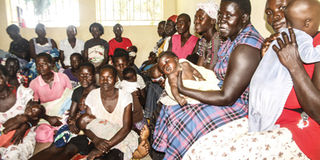Lira men embrace family planning

Seeking knowledge. Mothers wait for healthcare services at Agali Health Centre III in Lira District on September 6. Most people in the district are now aware of family planning services. PHOTO BY BILL OKETCH
What you need to know:
Justification. The uptake of family planning has been attributed to intensified health education.
Mr Samuel Opio of Ogur Sub-county in Lira District has four children. The peasant farmer is one of the few men who recently accessed a permanent method of family planning called vasectomy at Ogur Health Centre IV.
His wife, Ms Betty Opio, tried using Depo-Provera as a birth control measure, but the husband had to stop her after realising that the contraceptive was an inconvenience to the family.
“We have four children, two boys and two girls and they are enough for me and my wife. So, I didn’t want to bother my wife with the frequent visits to a health facility for short-term family planning method. I wanted to be the one to do it,” Mr Opio says.
Since most people are now aware of family planning services in Lira, the uptake of the service is gradually increasing.
Ms Filda Acula, a family planning focal person at the health facility, says when women visit the health facility for antenatal care together with their husbands, specialists take them through the health benefits of family planning.
“After health education, some of them pick interest and come back and ask for information about family planning services. So, if you explain to them well, they accept their women to join family planning,” Ms Acula says, adding that four men from Ogur and Agweng sub-counties recently had vasectomy.
Ogur Health Centre IV receives, on average, 20 women, who visit the facility to seek information about family planning services on a weekly basis.
“On a daily basis, we are giving them the services at the facility here. Right now, what we have out of stock is COC (Combined Oral Contraceptive) Pill, which we sometimes use for the management of side effects, but other commodities such as implantable and IUD (Intra Uterine Device), are available,” Ms Acula adds.
Mr Geoffrey Ariko, a bio-statistician at the health department, says the uptake of family planning is now high because they have intensified health education on the benefits of family planning.
Mr Edmond Aceka, the assistant district health officer, says with support from development partners, the health department has scaled up family planning services in rural areas, making it more accessible.
A September survey by Global Forum for Development (GLOFORD), a non-governmental organisation, however, established that most health facilities in Lira were unable to provide quality family planning services because of many challenges.
Mr John Ocen, the project officer in-charge of Health Systems Advocacy Partnership project with GLOFORD, says all the six public health centres visited did not have sufficient number of healthcare providers to meet client demand for permanent family planning information and services, .
Some healthcare providers also acknowledged that they are poorly trained to provide long-acting and permanent methods of family planning.
A midwife at Ogur Health Centre IV says women would demand for a specific method such as IUD, but because they don’t have the knowledge, they would keep referring them. Sometimes the service seekers get discouraged and failed to come back to the facility.
“We have challenges in the knowledge gap. Only one person at Ogur Health Centre is trained on IUD. So, capacity building is needed to most of us,” Ms Acula says.
Call for intervention
For the community to access quality family planning services, Mr Ariko says the gaps should be addressed.
“If a staff of Marie Stopes Uganda, a non-profit making organisation, comes this side, that is when the services are provided. Their role is usually voluntary but they cannot work independently, so they need to be empowered to start providing the services all the time,” Mr Ariko adds.
The GLOFORD’s executive director, Mr Morris Chris Ongom, says family planning is the only way to go if Ugandans are to develop.
“I believe family planning is beyond biology. It is about how many children, when do I give birth, where are the resources to take care of them, because every decision has an implication,” Mr Ongom says.
Mr George Okello Ayo, the Lira District vice chairperson, says they would mobilise and sensitise the community to embrace birth control measures.
Situational analysis
The 2016 Uganda Demographic and Health Survey carried out by the Uganda Bureau of Statistics (UBS) indicates that Uganda has registered improvement in family planning and reproductive health over the last five years.
The report also reveals an increase in the contraceptive prevalence rate (CPR) from 30 per cent in 2011 to 39 per cent in 2016.
Survey findings also reveal that injectables remain the most commonly used contraceptive method at 19 per cent for married women and 21 per cent for sexually active unmarried women.



